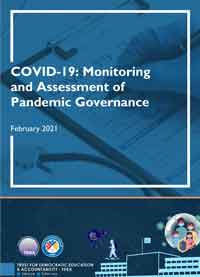- FAFEN demands effective and robust legislative ownership of the national response to the pandemic
ISLAMABAD, March 2, 2021: Free and Fair Election Network (FAFEN) has called upon the Parliament to provide leadership and guidance in ensuring transparency and public trust in the national COVID-19 response. With a third wave of COVID-19 feared, the elected representatives must take the challenge seriously and steer the national policy and effort to counter the pandemic.
According to FAFEN’s fourth governance monitoring report, 1,425 people died due to COVID-19 in January 2021. While these numbers show an ebb in the tide of pandemic at national level, stakeholders’ survey, and direct observation of the public and health offices in 35 project districts point towards concern with the potential to instigate a “Third Wave” of the pandemic. The public as well as the official attitude reflected an overall declining caution. Compared to 83 percent in December, compliance with social distancing guidelines declined to 59 percent of the public offices observed. Similarly, compliance with mask wearing requirements declined from 83 percent in December to 69 percent of the observed public offices.
In addition to monitoring the regular aspects of COVID-19 response, FAFEN’s report identifies technical skills of the healthcare staff as a crucial area that needs significant improvement. Placed in the context of the upcoming vaccination drive, questions of transparency still remain unanswered as does the issues related to public trust and capacity of the current healthcare system to run a nationwide vaccination campaign.
Both doctors and paramedics have also been infected or lost their lives in the line of duty. According to head-representative of doctors’ associations in 23 districts, the total number of doctors having been infected till date is 531. Likewise, for paramedics, respondents from 25 districts reported 1,638 accumulative cases. Exponentially higher number of COVID-19 related causalities among paramedics require special attention to the grievances of this group of stakeholders who are playing a pivotal role in healthcare for COVID-19 patients, and will continue their efforts in safe and effective administration of COVID-19 vaccine.
Seventy-one percent of both doctors and paramedics called for further capacity building to deal with COVID-19. This observation has been consistent since the start of FAFEN’s governance monitoring.
Issues in coordination and information sharing remained unresolved in January 2021. Diverging opinions about availability of PPE, as well as implementation of SOPs, clearly highlight the fact that in 46 percent districts the key stakeholders interviewed for this report do not agree on the status of implementation of SOPs. Considering that adherence to SOPs is the key to COVID-19 control, such findings need attention by policymakers as well as implementers, especially given the longer timeframe of vaccination completion in the country.
There is a need for a consolidated public information campaign that takes the people into confidence by sharing critical facts, including information on the methodology of vaccine selection from among the multiple options available, details of testing and approval process, etc.; and dispelling misinformation. This will not only raise awareness, build trust, but also allow people to make informed choices about their health.
Reflecting on the findings of its fourth COVID-19 governance monitoring report, FAFEN deems parliamentary oversight of the entire exercise critical to effectively deal with the devastating pandemic that has taken over 12,000 lives in Pakistan already. This will not only develop confidence of masses in the Parliament but will help with meaningful reforms in the health and pandemic governance of the country.
To download Urdu Press Release, click here | To download the complete report, click here


